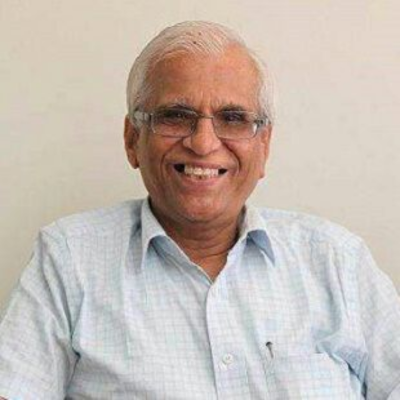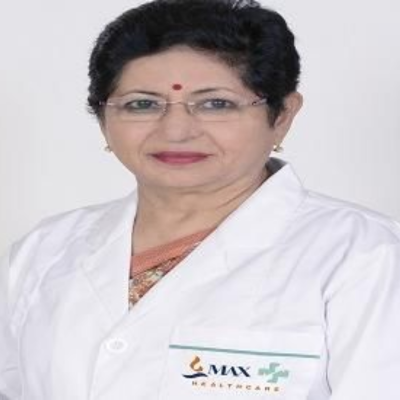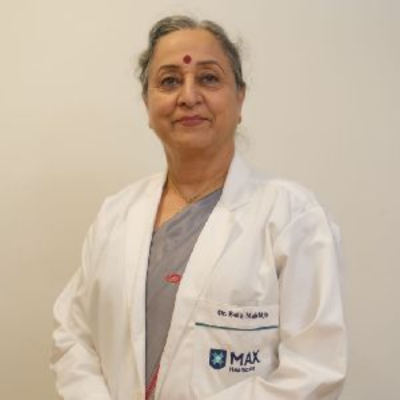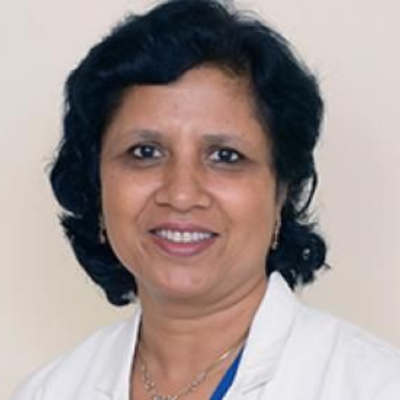The Role of Government Initiatives in Promoting Medical Tourism in India
 02 April,2025
Read More
02 April,2025
Read More
Enquire now in case of any assistance needed
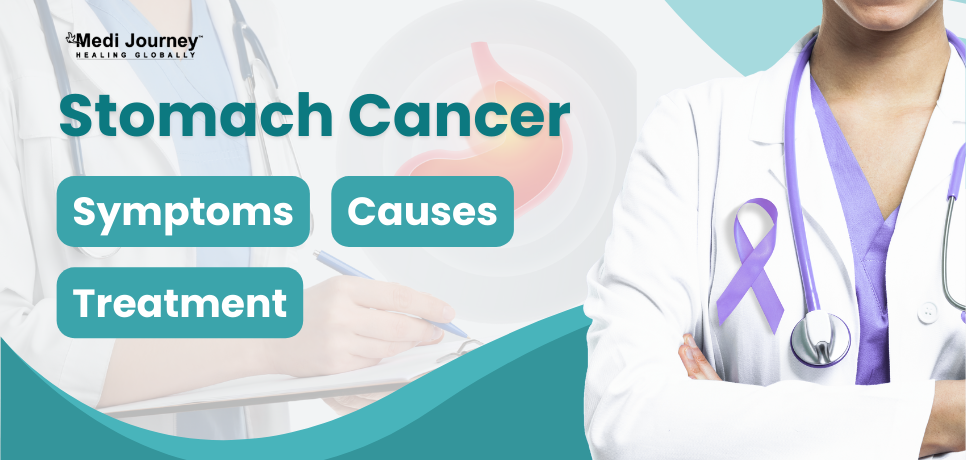
Have you ever eaten a delicious meal only to feel discomfort afterward? That persistent heartburn might be more than just indigestion. Today, we'll explore stomach cancer, a serious but treatable illness.
Picture your stomach, the hardworking organ that breaks down everything from juicy steaks to crunchy salads. Now, imagine a disruption in its normal functioning – abnormal cells start multiplying, forming tumors, and disturbing the smooth digestive process. That's stomach cancer in a nutshell.
But don't worry! This isn't a horror story. We can empower ourselves by understanding the risks, symptoms, and available treatments. Get ready because we're about to learn more about stomach cancer and how to conquer this potentially fatal disease!
Before we learn about stomach cancer, let's understand the organ itself. The stomach is a pouch-like organ that plays a vital role in digesting food. It comprises five parts: cardia, fundus, body, antrum, and pylorus. The wall of the stomach has five layers: mucosa, submucosa, muscularis propria, subserosa, and serosa. The extent or stage of stomach cancer is defined by the layers involved.
Stomach or gastric cancer is marked by abnormal growth of cells in the stomach wall. Cells from any layer of the wall can go haywire and form tumors. Over 1 million people are diagnosed with stomach cancer annually, and it has become the 5th most frequent cancer among people.
The type of stomach cancer depends on the type of cells it begins from. It can be classified as –
An oncologist is a highly skilled and specialized medical professional who diagnoses and treats stomach cancer.
Stomach cancer happens when the cells in the stomach wall start dividing uncontrollably. Exactly why this happens is still not known. However, several risk factors have been associated with it. These include –
People with one or more of these risk factors should consider getting a check-up at an advanced oncology hospital.
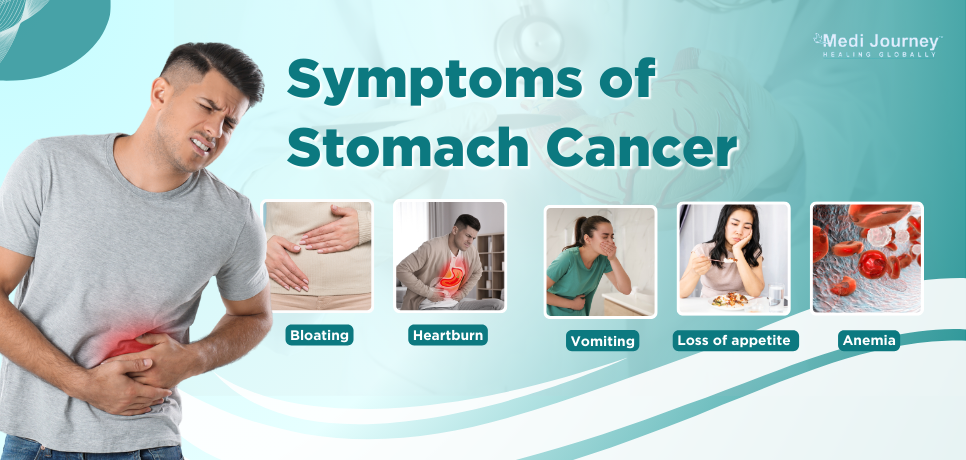
Symptoms of stomach cancer can be pretty vague initially. That's why it isn't easy to diagnose in the early stages. The symptoms might also depict other gastrointestinal conditions, such as stomach ulcers.
Early symptoms of stomach cancer are –
As the cancer disease progresses to advanced stages, the symptoms become more severe and concerning. These include –
Although these symptoms can be similar to those of other stomach diseases, people who are at an increased risk of developing stomachs must not ignore them. Symptoms such as difficulty swallowing and blood in stool or vomit warrant an immediate consultation with gastroenterologists.
To diagnose stomach cancer, the oncologist will ask about the symptoms you are experiencing and their severity. They will conduct physical examinations and take your medical and family history. The doctor will then order several tests to make a confirmed diagnosis of the cancer. These tests include –
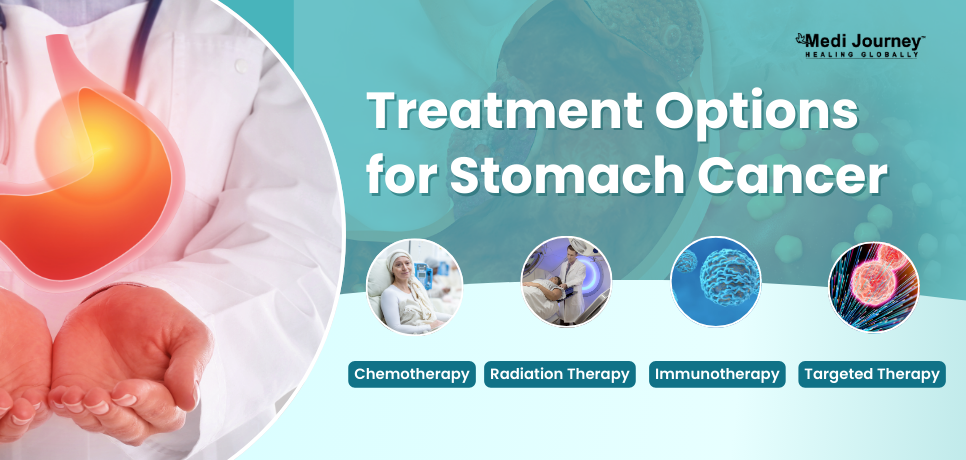
Stomach cancer treatment depends on multiple factors, such as the stage and type of cancer, if the cancer has spread to other body parts (metastasis), and your overall health.
A multidisciplinary team of doctors, such as gastroenterologists, medical oncologists, surgical oncologists, and radiation oncologists, will decide the best possible treatment plan for you.
Treatment options for stomach cancer include –
Oncologists may use different types of surgeries depending on the stage of gastric cancer and its location in the part of the stomach. Standard surgical techniques for treating stomach cancer are:
Chemotherapy is the use of cancer-killing cells. Doctors can give chemotherapy before surgery (neoadjuvant therapy) or after the surgery (adjuvant treatment). Types of chemotherapy for stomach cancer include:
High-energy beams of X-rays, protons, and other sources can also destroy tumors. This type of cancer treatment is known as radiation therapy. Oncologists can use radiation therapy before surgery to shrink or reduce tumor size. They can also give therapy after the surgery to kill any remaining cancer cells.
Intensity-modulated radiation therapy (IMRT) and 3D-CRT use computers to aim the radiation precisely at the tumor and deliver radiation from different angles. The treatment takes little time and can be completed within minutes.
Immunotherapy involves using medicines to boost immunity. It works by enhancing the ability of the immune system first to recognize and then fight cancer cells.
Oncologists use immunotherapy to treat advanced cancers such as stage 4 stomach cancer. They can also use it for cancer that comes back after treatment.
Side effects of immunotherapy are fever, skin rash, cough, vomiting, nausea, shortness of breath, muscle pain, and loss of appetite.
Targeted therapy is different from standard chemotherapy. Drugs used in targeted therapy attack specific chemicals and proteins in the cancer cells. These drugs can be used alone or in combination with chemotherapy.
Targeted therapy is not for everyone. Cancer specialists will check the cancer cells for the specific antigens to be present on the cancer cells and then decide if the drugs will work on them or not.
Common drugs used for targeted therapy are trastuzumab, fam-trastuzumab deruxtecan, ramucirumab, larotrectinib, and entrectinib.
Preventing stomach cancer entirely is difficult. However, by taking a few proactive steps, you can reduce the chances of developing stomach cancer. These include –
The survival rate for stomach cancer varies significantly depending on its stage at diagnosis. Other factors influencing the chances of beating stomach cancer successfully and surviving for a good time are –
The outlook for stomach cancer improves dramatically with earlier detection. For localized cancer (confined to the stomach), the 5-year survival rate is up to 75%. Timely diagnosis of gastric cancer is essential for more effective treatment options and gives a higher chance of cure.
Survival rates decrease considerably for advanced stages. For regional cancer (spread to nearby lymph nodes), the 5-year survival rate is 35%.
Stomach cancer, while a serious illness, is not without hope. Early detection is critical for successful treatment. If you're concerned about stomach cancer, schedule a checkup with your doctor, especially if you experience persistent symptoms. Don't hesitate to discuss your family history and any questions you might have. By staying informed, adopting healthy habits, and seeking medical advice when needed, you can take control of your health and fight stomach cancer effectively.
Doctor of Pharmacy
Dr. Deepanshu Siwach is a skilled clinical pharmacist with a Doctor of Pharmacy degree.?He has 4+?years of experience and has worked with thousands of patients. He has been associated with some of the top hospitals, such as Artemis Gurgaon.
Director
Kidney Transplant Surgeon, Uro-oncologist, Urologist
Aakash Healthcare Super Speciality Hospital, Dwarka, New Delhi
Dr. Vikas Agarwal is a reputed Urologist and Kidney Transplant Surgeon with an experience of more than 22 years. His expertise lies in a wide range of laparoscopic surgeries, including laparoscopic donor nephrectomy, kidney, prostate, and bladder cancer surgery....
Senior Consultant
Medical Oncologist
Nanavati-Max Super Speciality Hospital, Mumbai
Book Appointment WhatsApp UsSenior Director
Gynecologist and Obstetrician, IVF Specialist
Max Super Speciality Hospital, Shalimar Bagh, New Delhi
Book Appointment WhatsApp UsSenior Director
Gynecologist and Obstetrician, IVF Specialist
Max Smart Super Speciality Hospital, Saket, New Delhi
Book Appointment WhatsApp UsSenior Director
Gynecologist and Obstetrician
Max Smart Super Speciality Hospital, Saket, New Delhi
Book Appointment WhatsApp UsSenior Director
Gynecologist and Obstetrician
Max Smart Super Speciality Hospital, Saket, New Delhi
Book Appointment WhatsApp UsSenior Director
Gynecologist and Obstetrician
Max Smart Super Speciality Hospital, Saket, New Delhi
Book Appointment WhatsApp UsFill up the form and get assured assitance within 24 hrs!
The Art of Effective Communication
 24 January,2025
Read More
24 January,2025
Read More
Trusted by Patients
"I am Asim from Bangladesh and was looking for treatment in India for neuro. I visited many websites to get the complete information regarding the treatment but I was not satisfied as I was getting confused. In the meanwhile, one of my friends suggested I seek help from Medi Journey as he experienced his medical journey very smoothly and was satisfied with it. They have filtered the top 10 doctors as per experience, the success rate of surgery & profile, so it helps us to choose the best treatment in India. "
"For my knee surgery, Medi Journey guided me to BLK Hospital where I received exceptional care. The team's support and the expertise at BLK Hospital exceeded my expectations. Thank you Medi Journey for making my medical journey stress-free. "
"I came from Iraq for my granddaughter's eye surgery in India facilitated by Medi Journey, due to critical cases they advised us to get a second opinion from the different hospitals before going to surgery. Finally, we went to Fortis Escort Hospital, which helped us to get more confidence for diagnosis. Fortis Escort Hospital has the best eye surgeon team with the latest instruments. Thanks to all team members for providing a high-quality treatment in India at an affordable cost. "
"I came for my hair transplant in India, before coming I was so confused about choosing the best clinic and surgeon for me. But thanks to God one of my friends had a hair transplant in India through Medi Journey. He recommended me to go with them. I am completely happy with my experience with them. They were always very fast in their responses to me. the success rate of my hair transplant surgery is 100%."
"Artemis Hospital, suggested by Medi Journey, turned out to be a great choice for my treatment. The personalized assistance and medical care were exceptional. I'm grateful to Medi Journey for guiding me to a hospital that perfectly matched my needs. Highly recommended! "
"I came from Afghanistan for my treatment in India at Jaypee Hospital, Noida. I had a fantastic experience with Medi Journey. Kudos to them for their incredible support during my medical journey. They not only took care of all the logistics but also connected me with a fantastic healthcare team. Efficient, caring, and highly recommended for a hassle-free medical tourism experience."
"I am Adam from Kano, Nigeria, one of my friends from Nigeria was facilitated by Medi Journey, and he recommended us to go with them. I sent my all reports to them and within 48 hours they reverted with 4 options from different hospitals. They helped me to get a Visa letter from the hospital, arrange pick-up from the airport, and book a hotel for me. Their team is very honest and throughout our stay in India they are with us they are caring for us like his family members. BLK Hospital is the best hospital in India with a top surgical oncologist surgeon team, a very advanced OT, and a Radiotherapy department. I wish more success to Medi Journey. "
"Great experience at the Max Hospital for my spine surgery and was successfully done. I thank my neurosurgeon and his entire team. I recommended all of my country's people to Medi Journey for treatment in India, they choose the best hospital, the best doctors, and the best cost for patients."
"I came to India from Dhaka, Bangladesh for my father-in-law's cardiac surgery at Fortis Hospital. I was confused about choosing the best surgeon for him before coming, but their team helped me to choose the best hospital and best cardiac surgeon in India with very good cost and 100% success rate of surgery. I am very happy with the services, really they make my journey so comfortable that make me feel at home. Thanks again and I like people to choose "Medi Journey" as your travel guide. "
"I am Mohammad from Bangladesh came to India for my general health checkup. Medi Journey offers me the complete package including Pick-up from the airport, hotel services, and 24-hour assistance. They guide you to choose the best hospital in India, the best cost of treatment with top-most doctors and give you complete information about hotel booking, and pick-up from the airport before coming to India They have the best team to help. Always choose Medi Journey for your treatment in India."
